When it comes to enhancing your home’s security, privacy, and curb appeal, few improvements make as big an impact as a professionally installed fence. But not all fencing companies are created equal.
Whether you're dreaming of a classic wood privacy fence, a sleek aluminum perimeter, or a durable, low-maintenance vinyl option, the success of your project depends largely on choosing the right residential fence installer.
Hiring an experienced, reputable fencing contractor helps ensure that your fence not only looks great but also complies with local codes, withstands the elements, and lasts for years to come. Unfortunately, many homeowners underestimate the importance of vetting their installer, leading to costly repairs, disputes, or premature fence failure.
So, what should you look for when hiring a residential fence installer? In this post, we’ll walk you through seven key factors to consider, helping you choose a contractor who’s reliable, knowledgeable, and worth the investment.
Ready to get started and looking for a quote? Richmond, VA area customers can call 804-353-6030, and Tidewater and Hampton Roads, VA area customers can call 757-853-5669 to speak with one of our fence installation professionals. You can also submit an online request form.
Contents
- 1 1. Proven Experience and Specialization
- 2 2. Familiarity with Local Regulations and HOA Requirements
- 3 3. Transparent Quotes and Detailed Contracts
- 4 4. Quality Materials and Trusted Supplier Partnerships
- 5 5. Strong Portfolio and Customer Reviews
- 6 6. Clear Communication and Professionalism
- 7 7. Warranty Coverage and Post-Installation Support
- 8 Choose Your Residential Fence Installer Wisely
1. Proven Experience and Specialization
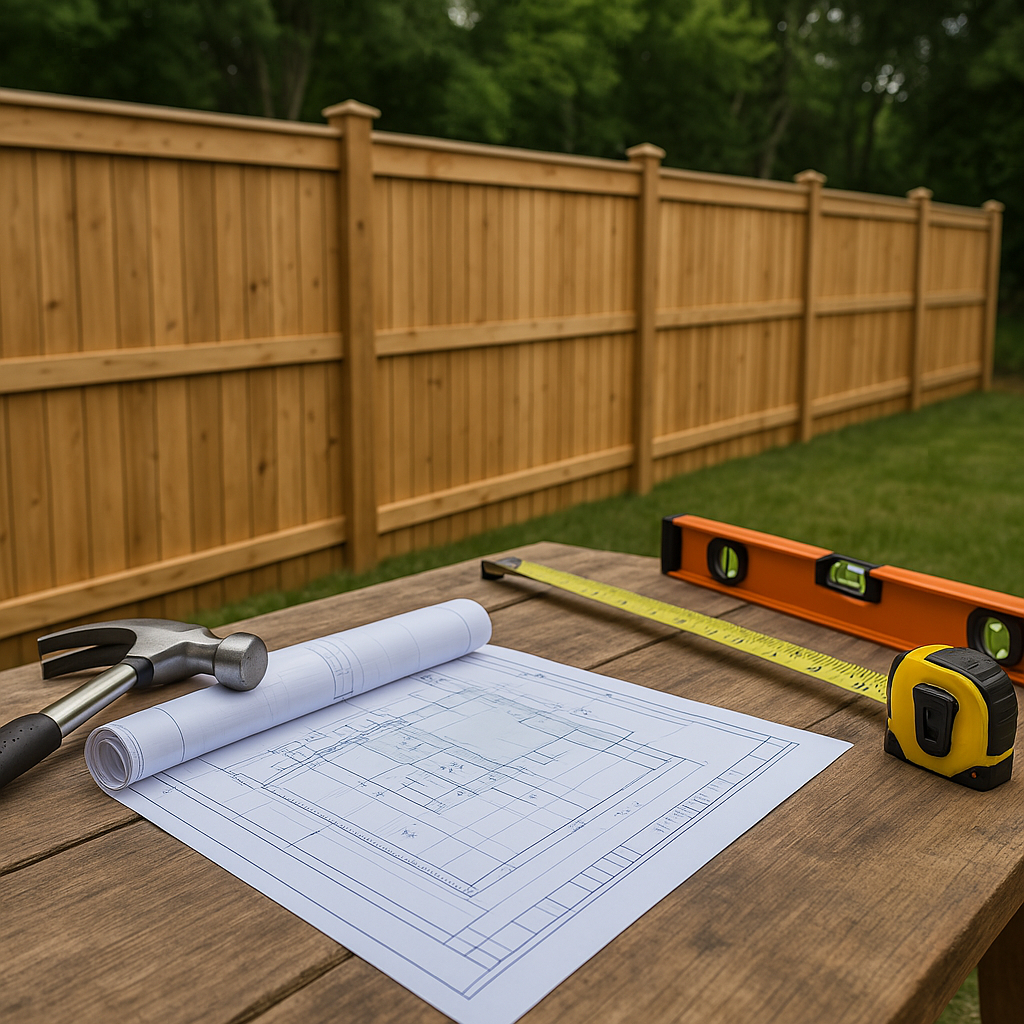
When it comes to hiring a residential fence installer, experience isn't just a bonus—it's essential. The process of installing a fence involves much more than digging a few holes and setting posts.
A truly qualified professional understands how to handle property grading challenges, post-depth requirements for your local climate, the characteristics of various materials, and the best installation methods for long-term durability.
Fence installation is one of those trades where practical knowledge matters just as much as technical skill. An installer with years—or even decades—of residential experience has likely encountered and resolved just about every kind of problem that could arise. Whether it’s an uneven yard, a tight property line, or tricky underground utilities, an experienced residential fence installer knows how to get the job done right the first time.
At Hurricane Fence Company, we’ve been in business since 1994, with a focus on residential fencing that spans every style and material—from timeless wood privacy fences to modern vinyl and sleek aluminum systems.
That kind of track record doesn’t just build trust—it builds expertise. Our crews have worked on urban properties in downtown Richmond, expansive lots in Chesapeake, and everything in between. And because we don’t manufacture fencing materials ourselves, our focus stays squarely on expert installation and quality customer service.
Why Specialization Matters
Many contractors offer fencing as an add-on service, but that doesn’t make them fence specialists. Be cautious of general handymen, landscapers, or builders who "also install fences." They may lack the specific training and tools needed to ensure your fence is level, properly anchored, and structurally sound over time. Improper installation can result in leaning posts, warped panels, poor gate operation, or even complete structural failure.
If you’re investing in something that should last 15–30 years, you want someone who installs fences day in and day out—not someone who’s figuring it out as they go.
Questions to Ask Your Installer:
- How many years have you been in business?
- Do you specialize in residential fencing, or is it part of a broader range of services?
- Can you show photos or reviews from similar residential projects?
2. Familiarity with Local Regulations and HOA Requirements
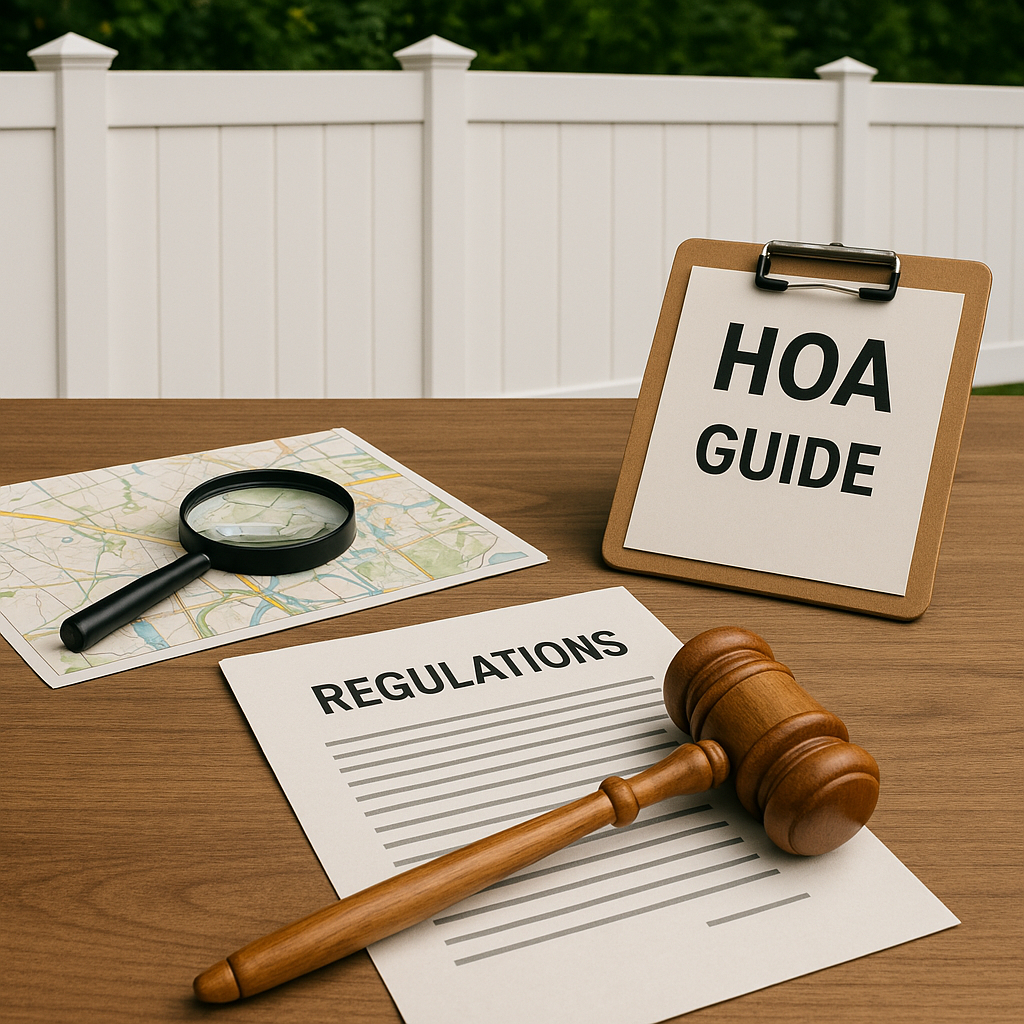
Fence laws vary—not just from state to state, but from city to city and even between neighborhoods. That’s why it’s vital to hire a residential fence installer who is deeply familiar with ordinances, zoning laws, and permitting processes across the Richmond and Tidewater areas.
A professional who installs fences in your area regularly will understand the intricacies of regional requirements and be able to navigate them efficiently, sparing you from headaches and fines.
For instance, certain areas in Richmond or Norfolk may require fences to be set back a specific distance from the property line, while others have strict height restrictions—especially near street corners, where visibility for drivers becomes a concern. And if you live in a community governed by a Homeowners' Association (HOA), your fence must comply with their aesthetic and material guidelines, which can be surprisingly strict.
Many fencing projects are delayed or derailed because a less-informed installer didn’t do the necessary due diligence. If your fence is built too high, encroaches on a neighbor’s property, or uses an unapproved material, you could be forced to remove and rebuild it—at your own expense.
What a Knowledgeable Installer Should Do:
- Verify exact property boundaries using site plans or surveys
- Help you apply for necessary building permits
- Review your HOA’s design and architectural guidelines
- Call 811 before digging to mark utility lines
- Offer solutions for unique lot challenges, such as slopes, easements, or right-of-way restrictions
At Hurricane Fence, we routinely work with local inspectors, city planning offices, and HOA boards throughout Central Virginia and the Tidewater area. We’re not just familiar with the paperwork—we actively guide our customers through it, ensuring the process is smooth and stress-free.
Key Takeaway:
Hiring an installer who understands local requirements is more than a convenience—it’s a safeguard. It ensures your fence is built legally, safely, and to the specifications your community expects.
3. Transparent Quotes and Detailed Contracts
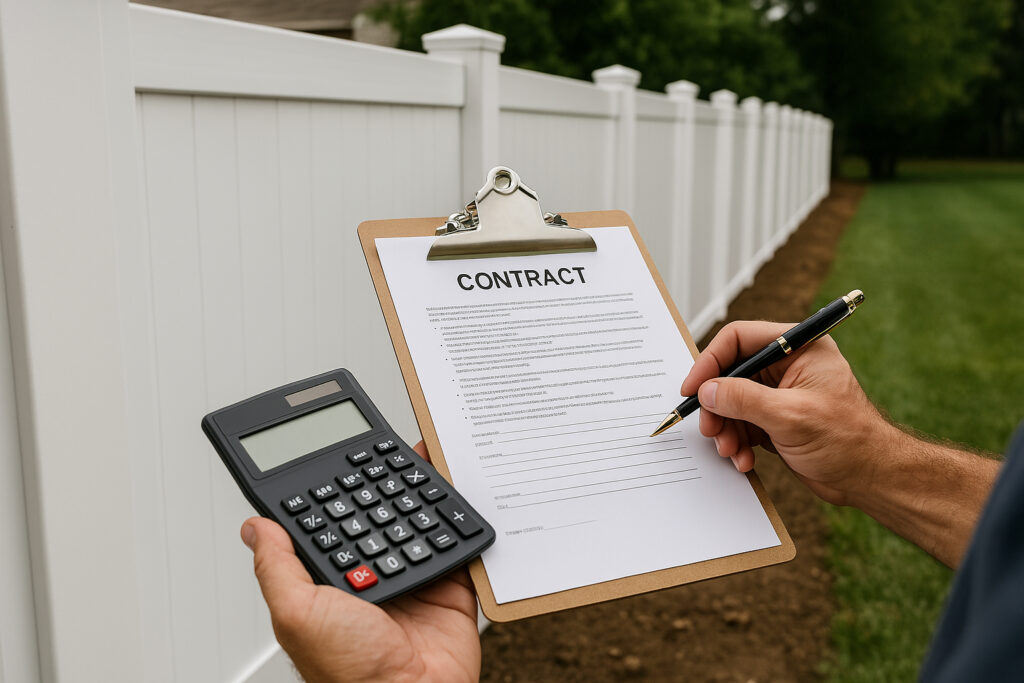
One of the clearest signs of a trustworthy residential fence installer is how they handle estimates and contracts. Transparency at this stage sets the tone for the entire project. A professional fencing company should be able to offer a clear, itemized quote that outlines exactly what you're paying for—no vague pricing, no surprise charges, and no verbal-only agreements.
Too often, homeowners fall into the trap of accepting a quick, over-the-phone estimate or a handwritten quote with little to no breakdown. While a rough estimate might seem convenient, it rarely tells the whole story. Important factors like material quality, post depth, labor costs, permit fees, and cleanup should all be reflected in writing.
At Hurricane Fence, we begin every project with an in-person site visit where we assess your property, take measurements, review your goals, and discuss any relevant municipal or HOA requirements. From there, we provide a formal, written estimate that includes a full scope of work. Once approved, we follow up with a detailed contract that lays out the timeline, materials, payment schedule, warranty coverage, and any contingencies.
Why It Matters:
Clear documentation not only protects you, the homeowner, but also holds the installer accountable. It ensures both parties are on the same page before the first post is set.
A vague or overly simplistic quote may leave out key services, such as:
- Post-concrete curing time (which may delay project completion)
- Debris removal and site cleanup
- Permit acquisition and inspection scheduling
- Gate hardware or custom features
Worse, some disreputable installers might quote low to win the job—only to “upsell” or add charges once work has already begun. A reputable residential fence installer avoids these bait-and-switch tactics and instead prioritizes honest, upfront communication.
What to Look For in a Quote:
- Line-by-line cost breakdown
- Start and finish dates
- Terms of payment
- Warranty coverage
- Clear terms
Having this information in writing gives you peace of mind and helps you compare multiple bids fairly. Remember, the cheapest quote is not always the best value—especially if it leaves out essentials or uses substandard materials.
4. Quality Materials and Trusted Supplier Partnerships
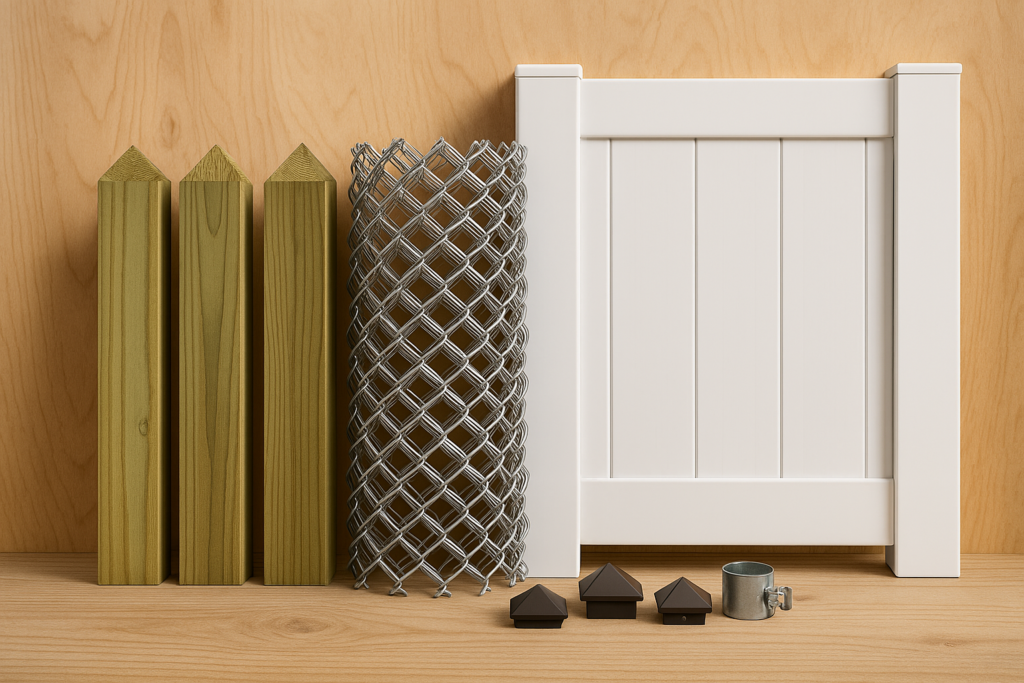
A well-installed fence is only as good as the materials used to build it. A reputable residential fence installer will work with high-quality, professional-grade products sourced from trusted manufacturers—not off-brand or big-box hardware designed for short-term use.
At Hurricane Fence Company, we furnish fencing materials from proven suppliers like Catalyst, which offers long-lasting aluminum and vinyl fence systems designed for residential environments.
These materials are backed by strong manufacturer warranties and have been tested to withstand Virginia’s wide range of weather—from humid summers to coastal storms and freezing winter cycles.
Material quality is especially important if you're investing in vinyl or aluminum fencing, both of which are designed to offer decades of maintenance-free performance when properly manufactured and installed. In contrast, lower-quality versions may fade, crack, or warp in just a few years—negating your initial investment.
For wood fencing, the installer should use pressure-treated pine or cedar that’s rated for ground contact and installed with corrosion-resistant fasteners. The same principle applies to gate hardware, hinges, post caps, and other components—each part plays a role in your fence's longevity.
Questions to Ask:
- What brands or suppliers do you work with?
- Are your materials covered by a manufacturer warranty?
- Do you offer different grades or styles based on budget or performance?
- How do you ensure material availability and delivery timelines?
A good installer will also walk you through the pros and cons of each material for your specific property. For example, aluminum may be ideal for pool enclosures due to code compliance and corrosion resistance, while vinyl is an excellent option for families who want privacy with close to zero ongoing maintenance.
Red Flag:
If a contractor won’t tell you where the materials come from—or worse, suggests using leftover or repurposed fencing—proceed with caution.
5. Strong Portfolio and Customer Reviews

One of the most reliable ways to evaluate a residential fence installer is by looking at their past work and listening to what previous customers have to say. A professional fencing company should have a readily available portfolio of completed projects—photos, case studies, or even physical examples in your area—that showcase their craftsmanship and versatility.
While a beautiful website and polished marketing materials are nice to see, they should be backed up by real-world proof. Can the installer show you a recent vinyl privacy fence in your neighborhood? Have they completed similar jobs with sloped terrain or challenging layouts? The ability to demonstrate repeatable success in residential settings is a strong indicator that you’re dealing with a true expert.
At Hurricane Fence, we’re proud of the work we do—and our customers are happy to talk about it. We maintain a collection of project photos and have hundreds of verified customer reviews across platforms like Google and Facebook. From simple backyard enclosures to HOA-compliant neighborhood installations, we’ve seen (and built) it all.
What to Look for in a Portfolio:
- A mix of fencing types (wood, vinyl, aluminum)
- Projects that match your style or property type
- Before-and-after photos that show transformation
- Attention to detail in gates, transitions, and grading
- Fences installed in your region or under similar conditions
The Role of Reviews and Testimonials:
Customer feedback can tell you a lot about how a company operates—from the professionalism of its crews to the quality of its cleanup. Look for consistent praise about punctuality, honesty, communication, and the final result. On the flip side, take note of any recurring complaints about delays, cost overruns, or poor workmanship.
Tip: Don't just scan star ratings—read full reviews to understand what the experience was like and how the company handled any issues. A quality residential fence installer will stand out not just when everything goes right, but also in how they resolve problems.
Questions to Ask Your Residential Fence Installer:
- Do you have references I can contact?
- Are there recent jobs I can visit nearby?
- Can I see examples of the fence style I'm considering?
6. Clear Communication and Professionalism
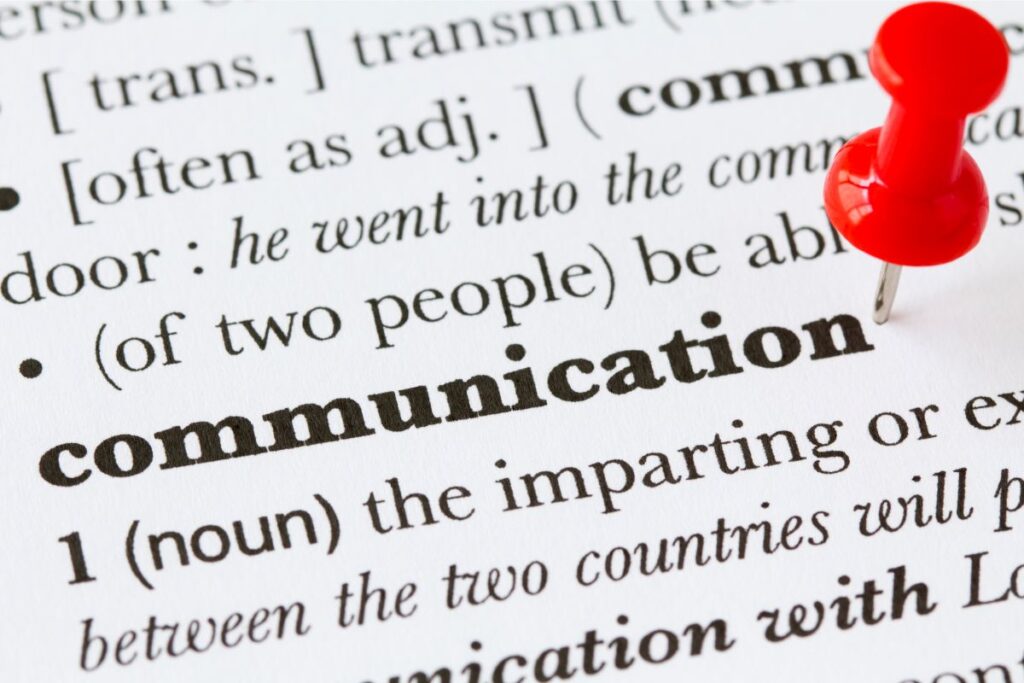
Installing a residential fence involves multiple steps—from site prep and material delivery to post-setting, panel installation, and final inspection. Throughout that process, clear and timely communication is key. A reputable residential fence installer should be responsive to your questions, transparent about timelines, and proactive about any issues that arise.
Professionalism starts with the first phone call or online inquiry. Did they return your message promptly? Did they show up for the consultation on time? Are they willing to walk you through options without pressuring you? These early signs often reflect how the rest of the experience will go.
Once a project is underway, communication becomes even more important. A great residential fence installer will keep you informed at every step—especially if weather, permitting, or material delays impact the schedule. They’ll set realistic expectations and avoid promising anything they can’t deliver.
At Hurricane Fence, strong communication is one of the most important parts of our service. Our team keeps homeowners updated throughout the project, from initial scheduling to final walkthrough, and we’re always available to answer questions before, during, or after installation. It’s how we’ve earned the trust of thousands of Virginia homeowners over the past 30 years.
Signs You’re Working with a Professional:
- Clear, written estimates and contracts
- Punctual arrival for consultations and installations
- Respect for your time, property, and neighbors
- Quick turnaround on questions or change requests
- Willingness to explain fencing options in plain language
Red Flags to Watch For:
- Vague or delayed communication
- High-pressure sales tactics
- Lack of clarity around project timelines
- Poor responsiveness after deposit is made
Your fence isn’t just another job—it’s part of your home. You deserve a residential fence installer who treats it that way.
7. Warranty Coverage and Post-Installation Support
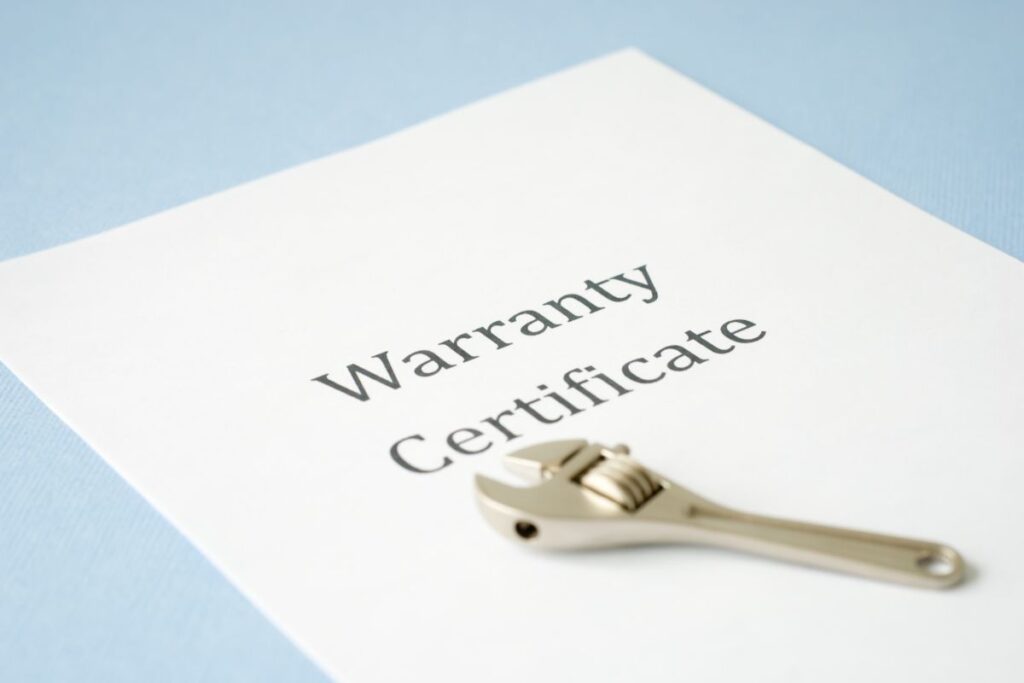
A truly professional residential fence installer stands behind their work long after the final post is set. One of the most overlooked but crucial aspects of choosing a fencing contractor is understanding their warranty policy—both for materials and for workmanship.
A strong warranty provides more than just peace of mind—it’s a sign of confidence in the quality of the installation. Unfortunately, not all fencing contractors are willing to back their work. Some may offer verbal guarantees with no documentation, while others may simply refer you to the manufacturer without clarifying what’s actually covered.
At Hurricane Fence Company, we make warranty coverage straightforward and dependable. Most of the materials we furnish—especially vinyl and aluminum systems from our trusted suppliers—come with strong manufacturer warranties that cover things like fading, cracking, rusting, or structural defects. In addition, we provide our own labor warranty to protect against installation-related issues like shifting posts, misaligned gates, or loose panels.
Key Areas Your Warranty Should Cover:
- Materials: Check whether the fencing material is covered against defects, UV damage, or corrosion.
- Labor/Installation: Understand how long the installer guarantees their workmanship.
- Gates and Hardware: Ensure latches, hinges, and locks are included.
- Transferability: Some warranties (like those offered by Catalyst) remain valid even if you sell your home—this can be a bonus for resale value.
Questions to Ask Before Signing:
- What is covered under the workmanship warranty, and for how long?
- Do I contact you or the manufacturer if there’s a problem?
- Are there any maintenance requirements to keep the warranty valid?
- What is the process for requesting a repair or service?
Equally important is ongoing support. Even a well-installed fence may need minor adjustments after its first heavy storm or seasonal ground movement. A quality residential fence installer won’t disappear after the final check clears—they’ll be there to assist you if something comes up.
When you choose Hurricane Fence, you're not just getting a fence—you’re gaining a long-term partner. Our team is here for you months or even years after installation, whether you need a gate adjusted or have a question about seasonal maintenance.
Choose Your Residential Fence Installer Wisely
Hiring a fence company is a decision that will impact your home’s appearance, value, and functionality for years to come. By knowing what to look for in a residential fence installer, you’re protecting your investment and setting the stage for a smooth, stress-free experience.
Let’s recap the 7 key things to look for:
- Proven Experience and Specialization
- Familiarity with Local Regulations and HOA Requirements
- Transparent Quotes and Detailed Contracts
- Quality Materials and Trusted Supplier Partnerships
- Strong Portfolio and Customer Reviews
- Clear Communication and Professionalism
- Warranty Coverage and Post-Installation Support
If a contractor can check all of these boxes, you’re likely in good hands.
At Hurricane Fence Company, we take pride in offering homeowners across Central Virginia and the Tidewater region the experience, integrity, and service they deserve. With over 30 years in business and thousands of successful installations behind us, we’re ready to help you bring your fencing vision to life.
Richmond area customers can call 804-353-6030, and for those in Portsmouth, Virginia Beach, Chesapeake, Newport News, Norfolk, and other surrounding areas, call 757-853-5669 to speak with one of our dedicated fencing professionals. Alternatively, send us a message online and a member of our team will reach out to you promptly.
Let’s build something great—together.




Leave a Reply